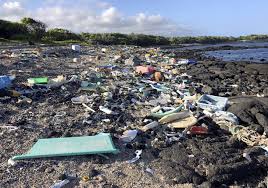
Plastic, whether we are aware of it or not, is everywhere.
It is found in $4 take-out lattes every morning, cars we drive to work each week, and cigarettes we smoke on weekends to let go of all the stress. The material can take up to 400 years to decay, and there has been a 379million tonne rise in plastic production since the 1950s.
National Geographic scientists have found that 91% of 8.3 billion metric tonnes of plastic are not being recycled. Plastic that is not recycled ends up in landfills or, if not contained, is likely to be blown into rivers and other natural water sources. The material can then end up in the ocean. Plastic straws, toothpaste canisters, and plastic bags are all causing problems. However, microplastics can also threaten the natural food supply chain. Microplastics can be 5mm or smaller in size and are formed by the breakdown of floating plastic in waterways exposed to sunlight. These micro substances can be consumed by smaller marine animals, becoming food for wildlife higher up the food chain. This creates a vicious cycle of waste. Many cases have been reported where chefs and fishers discover microplastics in seafood.
Musicians, venues and fans are the three largest demographics in the music industry. All have a role to play in creating a sustainable industry. It is not difficult to incorporate some environmentally-friendly solutions into your lifestyle.
Here are some ways to help reduce plastic pollution, whether you’re an artist or a fan of the music industry.
1. Artists
Participating in the BYOBottle movement as an artist gives you the unique opportunity to reach a broad audience. Your actions speak louder than your words, and there are many ways you can help create a plastic-free music industry. It’s essential to equip your crew members and bandmates with practical knowledge.
It is also important to uphold the standards at the venues you play at. It would be best if you were not afraid to set up refill stations backstage for you and your crew. If possible, give back power to your fans by asking them to bring their water bottles to your events.
2. Venues and Festivals
Over the past decade, various festivals, venues and shows have taken the initiative to reduce plastic waste and reuse it. In 2013, the Caloundra Music Festival was the first to ban plastic water bottles. The festival needed to clarify this to all attendees as soon as they purchased their tickets. They also communicated clearly with local plumbers and operators, and the groundskeepers. The festival was a huge success, with 97% of the fans surveyed after the event stating that they enjoyed the experience.
3. Fans
The biggest living force in the music business is the fans. However, we are also the largest contributor to plastic waste and pollution. Our expectations of how events should be run and the conduct of artists are our responsibility.
It’s a three-way street, and all music lovers, events, and musicians must work together if we want to make a difference in the future environment.
